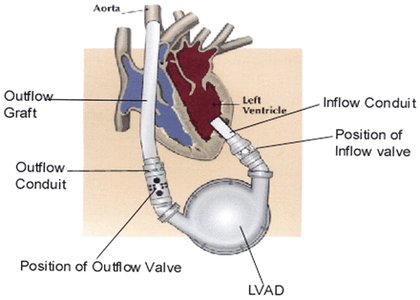- Home
- Editorial
- News
- Practice Guidelines
- Anesthesiology Guidelines
- Cancer Guidelines
- Cardiac Sciences Guidelines
- Critical Care Guidelines
- Dentistry Guidelines
- Dermatology Guidelines
- Diabetes and Endo Guidelines
- Diagnostics Guidelines
- ENT Guidelines
- Featured Practice Guidelines
- Gastroenterology Guidelines
- Geriatrics Guidelines
- Medicine Guidelines
- Nephrology Guidelines
- Neurosciences Guidelines
- Obs and Gynae Guidelines
- Ophthalmology Guidelines
- Orthopaedics Guidelines
- Paediatrics Guidelines
- Psychiatry Guidelines
- Pulmonology Guidelines
- Radiology Guidelines
- Surgery Guidelines
- Urology Guidelines
Newer generation LVAD associated with better outcomes for heart failure patients at 6 months: NEJM

A newer generation left ventricular assist device (LVAD) provides better outcomes for patients with advanced heart failure at six months compared to its predecessor, according to a new study. Researchers presented data from the MOMENTUM 3 (Multi-center Study of MagLev Technology in Patients Undergoing MCS Therapy with Heart Mate 3) trial at the 2016 Scientific Sessions of the American Heart Association and also co-published in the New England Journal of Medicine.
LVADs are mechanical pumps that are implanted inside a person's chest to help a weakened heart pump blood. Implanting the device can mean the difference between life and death for some open-heart surgery patients or for people waiting for a heart transplant. More than 300,000 U.S. patients each year qualify for some kind of mechanical assist device for heart failure.
"We are constantly striving to improve care for our patients who are experiencing the debilitating effects of advanced heart failure," said co-first author Dr. Yoshifumi Naka, director of the Cardiac Transplantation and Mechanical Circulatory Support Programs at New York-Presbyterian/Columbia University Medical Center. "This trial has shown that we are able to continue to refine and improve technology in mechanical circulatory support and offer patients better outcomes and new hope."
The Heart Mate 3 LVAD features a centrifugal-flow durable left ventricular assist system that utilizes fully magnetically levitated technology designed to lower adverse event rates, especially thrombosis. The miniaturized centrifugal flow device gives it a smaller profile and fewer moving parts than previous generation LVADs, which also helps with ease of surgical placement. The Heart Mate II has a different design, composed of an axial continuous-flow pump.
Of the 294 patients involved in the study, 152 were assigned to the centrifugal-flow pump group and 142 to the axial flow pump group. The goal was to evaluate survival free from device replacement and debilitating stroke over a six month time period. At the end of the six-month observation period, there were no significant between-group differences in the rates of death or disabling stroke, but reoperation for pump malfunction was less frequent in the newer generation centrifugal pump group. Suspected or confirmed thrombosis occurred in no patients in the centrifugal-flow pump group, but 14 patients from the axial-flow pump group did experience suspected or confirmed thrombosis.
"Device technology is continuously improving and improvement needs to be proven by research," said Dr. Naka. "I anticipate there will be new types of devices beyond the Heart Mate 3 which enables less invasive or minimally invasive insertion procedure with much lower complication profiles. That's why it is so important we continue this research."
You can read the full Article by clicking on the link :
Christopher Salerno, M.D. et al. A Fully Magnetically Levitated Circulatory Pump for Advanced Heart Failur. New England Journal of Medicine, November 2016 DOI: 10.1056/NEJMoa1610426

Disclaimer: This site is primarily intended for healthcare professionals. Any content/information on this website does not replace the advice of medical and/or health professionals and should not be construed as medical/diagnostic advice/endorsement or prescription. Use of this site is subject to our terms of use, privacy policy, advertisement policy. © 2020 Minerva Medical Treatment Pvt Ltd